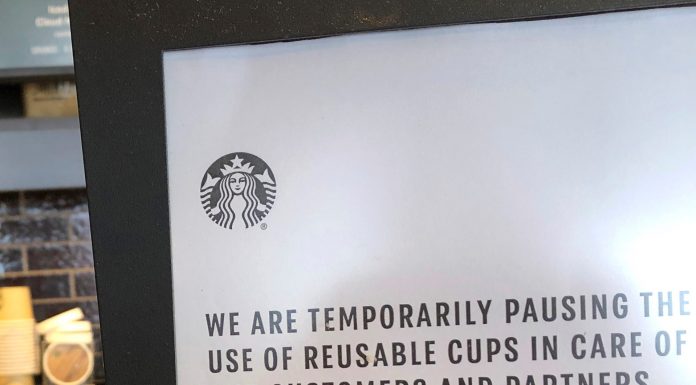(Associated Press) Some Starbucks stores in the U.S. and Canada may become drive-thru only while others could limit the number of people allowed inside, the company said, one day after the World Health Organization declared the outbreak of coronavirus a pandemic.
“As a last resort, we will close a store if we feel it is in the best interest of our customers and partners, or if we are directed to do so by government authorities,” Starbucks CEO Kevin Johnson said in a letter to customers.
Johnson emphasized that any closures will be temporary. The company said decisions will be made on a store-by-store basis.
The Seattle roaster has approximately 15,000 U.S. stores and 1,600 Canadian stores. Most are owned by the company but some — including locations in retail stores and airports — are run by licensees.
Starbucks has already increased the pace of sanitizing stores and put into place a temporary ban on use of personal cups or in-store mugs and glassware.
In a separate letter to employees, the company said it is temporarily expanding catastrophe pay for employees who have been diagnosed with or exposed to the virus. Employees can use up to 14 days of catastrophe pay in addition to paid sick leave, vacation time and personal days.
Employees with symptoms are also being asked to stay home.
National chains like Starbucks Corp. that serve customers face-to-face are bearing the brunt of some of the fallout from the virus. The company’s shares plunged 7% Thursday to a 52-week low. In the past month, since the gravity of the outbreak has hit home in the U.S., shares are down almost 30%.
Virtue-Signaling Starbucks Sees Business Drop after Opening to Homeless Loiterers
(Ben Sellers, Liberty Headlines) A recent scientific analysis of cell-phone data revealed that Starbucks‘ virtue-signaling decision to allow anyone to use its restrooms and loiter in its business without purchase had resulted in a 7.3 percent decline in patronage.
The findings, as reported by the conservative Powerline blog, were published this month by researches from the University of Texas and Boston College, in an article titled “The Perils of Private Provision of Public Goods.”
The paper noted that its methods had ruled out other mitigating factors, such as Starbucks’s public disclosures, by analyzing its store attendance relative to other coffee shops and restaurants that were not franchises.
Staggeringly, the decline was much larger for stores located near homeless shelters, including drops of up to 84 percent, it said. It also reduced the amount of time paying customers spent at the establishment..
Starbucks made the decision after weathering accusations of racism in May 2018 from two black men who were waiting on a friend before ordering.
In response to the negative publicity and threats of litigation, it closed its stores for a day of sensitivity training and reopened with its newly inclusive policy.
But despite the underlying claim of racism, the researchers found that the new policy effectively discouraged all customers.
“Wealthier customers reduced their visits more, but black and white customers were equally deterred,” it said.
There was, however, one positive benefit to the community: fewer homeless people using the streets as their personal toilet.
“The policy led to fewer citations for public urination near Starbucks locations, but had no effect on other similar public order crimes,” said the report.
“These results show the difficulties of companies attempting to provide public goods, as potential customers are crowded out by non-paying members of the public,” it concluded.



